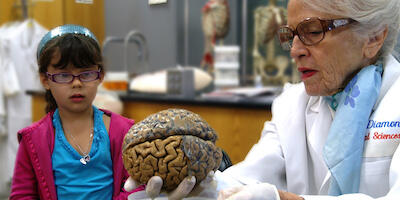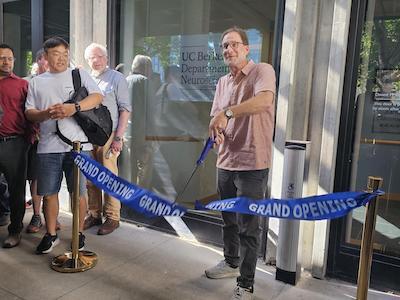The discipline of neurobiology was first formally represented on the UC Berkeley campus in the middle 1960s when a Chancellor’s Advisory Committee on Neurobiology was formed at the urging of several prominent faculty members, including Gunther Stent, Horace Barlow, and Gerald Westheimer. By the early 1970s, the neurobiology faculty had grown within a variety of departments (Physiology, Anatomy, Electrical Engineering, Zoology, Optometry, and Psychology), and a Graduate Group in Neurobiology was formed. Gunther Stent , Horace Barlow, and Gerald Westheimer.
Gunther Stent , Horace Barlow, and Gerald Westheimer.
A major reorganization of graduate education in biology at UC Berkeley was initiated in 1980. By 1989, 13 small biology departments on campus were replaced with the Department of Molecular and Cell Biology (MCB)(link is external). At that time, the discipline of neurobiology was formally and administratively recognized by the university, when it created the Division of Neurobiology within the Department of MCB. But this recognition only took the process for organizing neuroscience at UC Berkeley halfway.
In the early 1990s, neuroscience at Berkeley was distributed across campus in many different departments. MCB’s Division of Neurobiology was established as the intellectual center for molecular and cellular neurobiology. Similarly, the Department of Psychology(link is external) emerged as the de facto center for behavioral and cognitive neuroscience. The campus neuroscience community needed to be unified.
Starting in the mid-1990s, the groundwork began to be laid for a much bolder and more interactive program on campus, stretching from genes and molecules to behavior and cognition. This was felt to be critical since neuroscience transcends the boundaries that define traditional academic departments and modes of education and support. Indeed, neuroscience has emerged as its own multidisciplinary field, spanning almost every area of modern science from psychology to biology to physical science.

Areas in red/yellow indicate brain regions that undergo cortical thinning in Alzheimer’s disease. These regions include prominent parts of the medial temporal lobe memory system and the default mode network. Credit: Jagust lab.

UC Berkeley neuroscientist Marian Diamond inspiring the next generation of scientists — a still from "My Love Affair with the Brain: The Life and Science of Marian Diamond".
In 1995, Olympic tennis champion Helen Wills (UC Berkeley class of 1925) gave a gift that endowed the Neuroscience PhD Program, which brought researchers on campus together around a common goal to train the next generation of leaders in neuroscience. Wills' gift also helped provide initial funding for the Center for Neuroscience, which was created in 1997 under the leadership of professors Carla Shatz and Corey Goodman, who served as its first directors. The center was created to meet the programmatic needs of integrating the diverse campus neuroscience community; to provide a home for new faculty appointed jointly in a variety of existing departments; and to oversee the Neuroscience PhD Program. In 2000, the Center for Neuroscience was renamed the Helen Wills Neuroscience Institute (HWNI) in honor of her generous gift, and the Neuroscience PhD Program accepted its first class in fall 2001.
After Shatz and Goodman, HWNI was led by directors Robert Knight (2001-2011), John Ngai (2011-2013), and Ehud (Udi) Isacoff (2014-current). The institute has expanded to include over 70 faculty members from many different academic departments, who host approximately 60 Neuroscience PhD Program students and 150 postdoctoral scholars each year. We also have over 140 PhD Program alumni who work in a variety of careers across the globe.
In the early 2020s, Dan Feldman(link is external), along with other HWNI faculty, led the effort to establish a Department of Neuroscience at Berkeley, which launched in 2024(link is external). Feldman is the inaugural chair of this new academic department, which is now home to the Neuroscience PhD Program, a new undergraduate major in neuroscience, and scientists who study the entire range of neuroscience from molecules to behavior and cognition, including computational neuroscience and neurotechnology.
HWNI — which is a research unit within the Office of the Vice Chancellor for Research — remains as an interdepartmental institute for neuroscience, and continues to promote cross-campus neuroscience research, as well as sponsoring scientific events, major research initiatives(link is external), and research and technology centers(link is external). The Neuroscience Department and HWNI work closely together to support neuroscience research and education at UC Berkeley.

Helen Wills in 1932.

Inaugural chair Dan Feldman cuts the ribbon to open the Neuroscience Department. Photo by Peony Yu.
